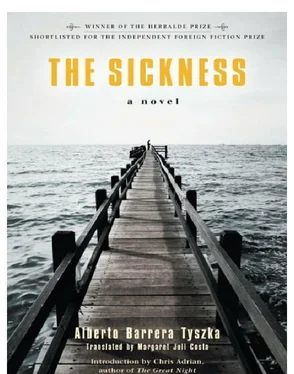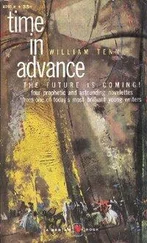“It drags a bit, doesn’t it?” he says, but immediately regrets having said this. “It drags a bit.” What does that mean exactly?
“Yes, it does,” she replies, after a pause.
Andrés gives her a broad, grateful smile. Her smile is rather less broad, but he doesn’t mind. The barman returns with the beer, and the woman pays. Andrés asks if she lives on Isla Margarita, but she says, no, she lives in Maracay, she’s with her husband, who has come to the island on business. Andrés understands then that the fat guy speaking interminably into his phone to no one at all is, first, her husband, and second, a man who does deals and goes on business trips. The woman doesn’t leave. She appears to be waiting for his coffee to arrive. She doesn’t seem particularly bothered about taking her husband’s drink to him as quickly as possible. Secretly, it pleases Andrés to think of the beer getting warm. They begin a desultory conversation, as if led on by natural curiosity, as if the only thing that has brought them together is the implacable need to kill time. Thus he learns that her name is Yadira, that she does little else but be the fat guy’s woman, that she’s not married to him, although she calls him her husband, that they have no children, and it remains unclear whether they live together or if Yadira is his second front, the branch office of the fat guy’s proper family. Andrés lies and says he’s divorced and is going with his father to spend a few days at the beach: it’s sometimes good to get a change of air, he says. He’s not quite clear why he’s saying all this, but feels it’s part of the game, that this is how he’s expected to behave. He orders another coffee. She continues to talk about her life, more cheerfully now, offering more details. The can of beer sits sweating on the bar.
Yadira is talking about her adolescence, telling him why she left school, when, suddenly, the fat guy with the cell phone appears, his face pressed to the fiberglass window, where he’s watching them from outside, from the deck. He raps with his knuckles on the opaque plastic, his squashed nose looking even more like a snout. He’s obviously not at all pleased. Yadira doesn’t even say goodbye. She picks up the can and leaves.
“Where did you go to buy the coffee? Caracas?” his father asks.
“I was talking to a girl,” Andrés says, smiling and proffering the small disposable cup. His father takes a sip and scans the deck, as if trying to locate which girl had kept his son talking.
“That one.” Andrés saves him the trouble and points at the fat guy, who is no longer issuing instructions down his cell phone, but is clearly telling Yadira off.
“She’s pretty,” Javier says.
Andrés nods. Then they turn back to the island. Now it really is an island; they can make out its shape and texture, the yellowish-red color of the parched earth. The glare of the sun burns their eyes. Then his father, by various circuitous routes, tries to find out if there’s some special reason for the journey they’re making. Andrés senses at once what his father is after and realizes that behind all his father’s words lie the clinical tests, the CT scan, the results from the MRI scan. . There they all are in the middle of the sea. There, too, are an operating room, catheters snaking through the water, drifting gauze, tubes, bits of paper, syringes. The sun is a yellow stethoscope. Andrés snatches a sideways glance at his father, using his right hand clamped to his eyebrows as a sun visor. This could be a good moment to tell him the truth. Is it? Is it a good moment? Isn’t it perhaps too soon? They haven’t even reached the island yet. What would happen then? What would the trip be like once Andrés has told him the truth?
“I don’t know,” his father says, trying to bring what he’s trying to ask to a close. “I just thought there might be something else, you know what I mean.”
There is always something else. Something that moves and hurts and no longer works. That is the inevitable story of bodies, the biography of deterioration. Health is an immutable ideal. The most perverse of all utopias. Michel Foucault said that, viewed from the experience of death, illness can even be seen as a function of life. “Paradoxically, from the corpse’s point of view, it looks like life.” Exactly. Health doesn’t exist, it’s a heaven that forms no part of existence: we human beings can only live while sick. It’s just that in his father’s case, the illness is in its final stages. What comes after that? His father is still looking at him, as if secretly he, too, was awaiting that revelation. Why doesn’t he tell him the truth now, this instant?
Yadira’s scream is like a blow with a stone. Everyone spins round: she’s not actually lying on the ground, but that’s only because the fat guy has hold of her by the hand. He has just punched her in the face. Yadira is shielding her face and shaking her head.
“Let me go!” she howls.
The only response from the fat man is to give her a kick. Then another, in her belly or higher up. He may have struck her ribs or her breasts. Andrés tries to rush to her aid, but his father holds him back. “Don’t be a fool,” he says. “Don’t get involved.”
His father is so tense that his nails dig into his son’s body. The other onlookers cry out; the German tourists watch, not entirely clear if what they are seeing is real or part of some picturesque welcome ceremony; two of the crew members run toward the couple and try to intervene, but not before the fat man has slapped Yadira so hard that this time he floors her. When they grab hold of him, he continues to struggle and roar, heaping insults on her. Another two members of the crew arrive and carry him, struggling, away. Yadira remains alone for a few seconds, sitting on the deck, shrunk in upon herself. Head bowed, she covers her face and sobs, like a small wounded, frightened animal. Andrés tries again to go over to her, but his father, with surprising force, stops him.
“No, don’t you go,” he says quietly. “Not unless you want her to get an even worse beating.”
Andrés looks at him in surprise. A woman goes to Yadira and helps her up, giving her a handkerchief to wipe away the blood on her face. As Yadira walks toward the restroom, she briefly catches Andrés’s eye and immediately looks away.
As they drive off the ferry, they pass the couple. Yadira still has her eyes fixed on the ground, and beside her is the fat man, talking on his cell phone, while a driver loads their suitcases into the trunk of a taxi. Then the driver opens the car door, and the fat man stands to one side, still talking, so that Yadira can get into the car first. When she does, he roughly strokes her hair, and she, rather unconvincingly, avoids his touch. During the whole journey to the hotel, Andrés keeps looking at the taxi in his rearview mirror. At one point, on the highway, the evening light transforms the taxi into a razor blade, a slender metal blade following them, unhurriedly, always keeping the same distance, the same speed, always there, always sharp, always following them. Andrés looks at his father sitting next to him, overcome by sleep, no longer asking any questions.
Sunk in sleep, he seems happier, he seems safe.
Dear Dr. Miranda,
You answered me! I still can’t believe it! I swear that as soon as I saw your name in my inbox, I froze. My eyes filled with tears, I mean it. I got up, I took a few steps, sat down again, got up, sat down. . I didn’t know what to do. I felt like shouting, jumping, running. I wanted to go out and ring the neighbors’ doorbells or rush to the window and shout: He wrote to me! Dr. Miranda has finally written to me! My eyes filled with tears, Doctor, they really did. In fact, to be honest, they’re still full of tears. I think that I’m too shocked right now to be able to answer. I just wanted to say thank you, Doctor. Thank you! Thank you! Thank you!
Читать дальше












